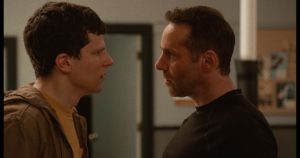As a trenchant examination of the roots, expression, and consequences of toxic masculinity, THE ART OF SELF DEFENSE has no peers. As a black comedy told with a straight face and a tone of conviction, it is a first rate guilty pleasure. Any film that can draw guffaws as a small child is gently choked into unconsciousness is a treasure. Unsettling, to be sure, as it holds up a funhouse mirror to a culture that spits on kindness and worships the alpha male. Yet, in its stylized rhythms and disconcertingly orderly visuals, its takes its obsession with details and absolute commitment to making a premise that starts in the real world continue to seem reasonable as it bounds purposefully into the surreal, forcing its brutal truth on us with equally brutal humor that will leave a psychic mark. You have been warned.
Our protagonist about to embark on a hero’s journey to the heart of darkness is Casey (Jesse Eisenberg), an awkward accountant with self-esteem issues, a self-effacing politeness, a life of solitude except for his beloved dachshund, and a social obtuseness that is as startling as it is complete. Though friends with his boss, he longs for acceptance by troglodyte co-workers who delight in dissing the man for doing his job, and Casey for not being his buddy. The break room becomes a battleground of male dominance with a confused Casey at the bottom of the heap. The emotional scars become physical ones when, on a nighttime stroll in search of kibble, Casey is beaten senseless by a roving band of motorcyclists who begin their assault by asking if he has a gun.
In a moment of revelation on a par with Saul on the road to Damascus, Casey awakes from his torpor when he awakes from his resulting coma. Outwardly the same emotionally repressed guy, he taps into a primal part of himself. He seeks to become the thing he fears, and finds himself in a karate class led by the Sensei (Alessandro Nivola), a man of quiet intensity who demands unwavering loyalty and unquestioning devotion from the students at his dojo. Is it discipline or fascism? By the time we find out, blood has been drawn, the weak have suffered, and the place of women, in the person of the dojo’s only female student (Imogene Poots), in the grand scheme of things has been laid out with ferocious clarity.

Jesse Eisenberg, Alessandro Nivola
Eisenberg and Nivola are perfect foils. Never breaking the deadpan tone set by writer/director Riley Stearns, the teacher-student relationship expands into very dark places, with Sensei feeding on Casey’s self-doubts and desperation to please with carefully calculated emotional abuse and manipulation that turns a compliment into a put-down. It is terrifying to behold on many levels, all the moreso because of Nivola’s knack for faking sincere caring and concern while delivering a death blow. As for Eisenberg, it is a wonder to behold how he uses the blank affect he employs to convey so much, and so vividly. When Casey returns from the hospital after his beating to find just one voice mail waiting for him, and from his boss, the disappointment is palpable, not just for the dearth of messages, but also for the one he does have not being from the boorish office clique that has rejected him. The compulsion to buy groceries that are all yellow, the same color as the belt he has just earned, has a tragic sweetness as he acknowledges it to the cashier, misreading the consternation as something else entirely. This is a story of broad violence that requires the subtle delicacy of actors highly capable of being so finely attuned to the idiom as well as the subtext. It’s not just effective, it is uncanny in its sheer perfection.
THE ART OF SELF-DEFENSE is a breathtaking excursion into the dark heart of modern culture’s definition of manhood, and by extension, personhood. Enlightening, disquieting, and compelling in its absolute fearlessness, it’s a quirky J’accuse worthy of Zola, and just as scathing.
Your Thoughts?